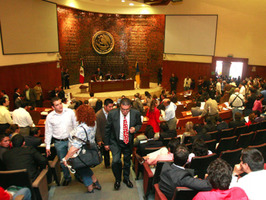Jalisco officials hope that the Instituto de Justicia Alternativa (Institute of Alternative Justice) will be up and running and mediating on minor crimes by the end of June.
The institute will be similar to "Restorative Justice" agencies in other countries, where meetings are set up between offenders, victims and both parties’ family and friends in which they deal with the consequences of the crime and decide how best to repair the harm.
Many academics believe the framework can serve as a successful alternative to the current way of thinking about crime and criminal justice.
Although the Jalisco Congress passed a bill approving the creation of the institute in 2007, it wasn’t until February of this year that Rafael Castellanos was named as its director.
The government has earmarked 19 million pesos to get the institute staffed and operating by June, although an office space still needs to be found.
According to Castellanos, mediation as a tool for justice will be targeted at minor offenders who have no resources to defend themselves or immediately repair the financial damage they have caused.
Jalisco’s prison population of 16,000 could be reduced significantly if around 2,000 cases a year were handled by the new agency, Castellanos said.
The average criminal case takes around 38 months to resolve – the goal for the institute would be 60 days, he said.
The institute would not handle cases of robberies involving sums of more than 29,000 pesos, Castellanos noted.
In other nations (and particularly in some U.S. states), restorative justice is seen as a victim-centered response to crime rather than simply a means of reducing the prison population. Whether Jalisco’s system will follow the same basic principle is still not clear.
In some U.S. states, non-violent offenders work in closely monitored community projects, earning money with which to make financial restitution to their victims and their victims’ families, as well as repay court and corrections costs.
One benefit of the new institute would be to reduce the workload of 108 criminal judges in the state of Jalisco.
If mediators cannot reach an agreement after three sessions between the accused and victims, cases will be sent back to the regular justice system.



